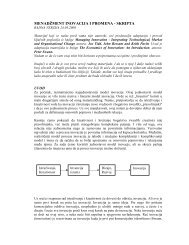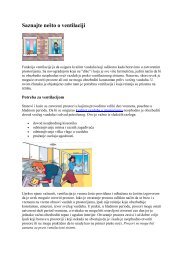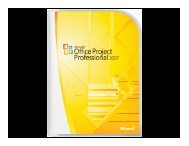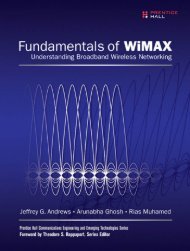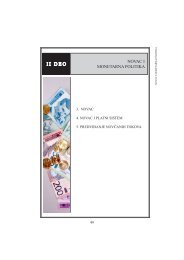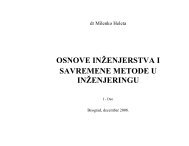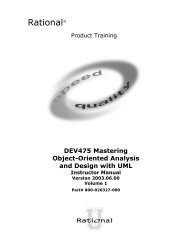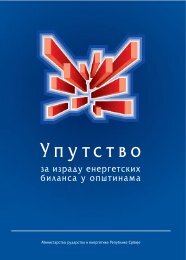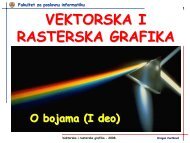- Page 2 and 3:
Rational UniversityDEV475 Mastering
- Page 5 and 6:
AcknowledgmentsThe development of t
- Page 7 and 8:
► ► ► Module 0About This Cour
- Page 9 and 10:
Module 0 - About This CourseCourse
- Page 11 and 12:
Module 0 - About This CourseIntende
- Page 13 and 14:
Module 0 - About This CourseRationa
- Page 15 and 16:
Module 0 - About This CourseRationa
- Page 18 and 19:
DEV475 Mastering Object-Oriented An
- Page 20 and 21:
DEV475 Mastering Object-Oriented An
- Page 22 and 23:
DEV475 Mastering Object-Oriented An
- Page 24 and 25:
DEV475 Mastering Object-Oriented An
- Page 26 and 27:
DEV475 Mastering Object-Oriented An
- Page 28 and 29:
DEV475 Mastering Object-Oriented An
- Page 30 and 31:
DEV475 Mastering Object-Oriented An
- Page 32 and 33:
DEV475 Mastering Object-Oriented An
- Page 34 and 35:
DEV475 Mastering Object-Oriented An
- Page 36 and 37:
DEV475 Mastering Object-Oriented An
- Page 38 and 39:
DEV475 Mastering Object-Oriented An
- Page 40 and 41:
DEV475 Mastering Object-Oriented An
- Page 42 and 43:
DEV475 Mastering Object-Oriented An
- Page 44 and 45:
DEV475 Mastering Object-Oriented An
- Page 46 and 47:
DEV475 Mastering Object-Oriented An
- Page 48 and 49:
DEV475 Mastering Object-Oriented An
- Page 50 and 51:
DEV475 Mastering Object-Oriented An
- Page 52 and 53:
DEV475 Mastering Object-Oriented An
- Page 54 and 55:
DEV475 Mastering Object-Oriented An
- Page 56 and 57:
DEV475 Mastering Object-Oriented An
- Page 58 and 59:
DEV475 Mastering Object-Oriented An
- Page 60 and 61:
DEV475 Mastering Object-Oriented An
- Page 62 and 63:
DEV475 Mastering Object-Oriented An
- Page 64 and 65:
DEV475 Mastering Object-Oriented An
- Page 66 and 67:
DEV475 Mastering Object-Oriented An
- Page 68 and 69:
DEV475 Mastering Object-Oriented An
- Page 70 and 71:
DEV475 Mastering Object-Oriented An
- Page 72 and 73:
DEV475 Mastering Object-Oriented An
- Page 74 and 75:
DEV475 Mastering Object-Oriented An
- Page 76 and 77:
DEV475 Mastering Object-Oriented An
- Page 78 and 79:
DEV475 Mastering Object-Oriented An
- Page 80 and 81:
DEV475 Mastering Object-Oriented An
- Page 82 and 83:
DEV475 Mastering Object-Oriented An
- Page 84 and 85:
DEV475 Mastering Object-Oriented An
- Page 86 and 87:
DEV475 Mastering Object-Oriented An
- Page 88 and 89:
DEV475 Mastering Object-Oriented An
- Page 90 and 91:
DEV475 Mastering Object-Oriented An
- Page 92 and 93:
DEV475 Mastering Object-Oriented An
- Page 94 and 95:
DEV475 Mastering Object-Oriented An
- Page 96 and 97:
DEV475 Mastering Object-Oriented An
- Page 98 and 99:
DEV475 Mastering Object-Oriented An
- Page 100 and 101:
DEV475 Mastering Object-Oriented An
- Page 102 and 103:
DEV475 Mastering Object-Oriented An
- Page 104 and 105:
DEV475 Mastering Object-Oriented An
- Page 106 and 107:
DEV475 Mastering Object-Oriented An
- Page 108 and 109:
DEV475 Mastering Object-Oriented An
- Page 110 and 111:
DEV475 Mastering Object-Oriented An
- Page 112 and 113:
DEV475 Mastering Object-Oriented An
- Page 114 and 115:
DEV475 Mastering Object-Oriented An
- Page 116 and 117:
DEV475 Mastering Object-Oriented An
- Page 118 and 119:
DEV475 Mastering Object-Oriented An
- Page 120 and 121:
DEV475 Mastering Object-Oriented An
- Page 122 and 123:
DEV475 Mastering Object-Oriented An
- Page 124 and 125:
DEV475 Mastering Object-Oriented An
- Page 126 and 127:
DEV475 Mastering Object-Oriented An
- Page 128 and 129:
DEV475 Mastering Object-Oriented An
- Page 130 and 131:
DEV475 Mastering Object-Oriented An
- Page 132 and 133:
DEV475 Mastering Object-Oriented An
- Page 134 and 135:
DEV475 Mastering Object-Oriented An
- Page 136 and 137:
DEV475 Mastering Object-Oriented An
- Page 138 and 139:
DEV475 Mastering Object-Oriented An
- Page 140 and 141:
DEV475 Mastering Object-Oriented An
- Page 142 and 143:
DEV475 Mastering Object-Oriented An
- Page 144 and 145:
DEV475 Mastering Object-Oriented An
- Page 146 and 147:
DEV475 Mastering Object-Oriented An
- Page 148 and 149:
DEV475 Mastering Object-Oriented An
- Page 150 and 151:
DEV475 Mastering Object-Oriented An
- Page 152 and 153:
DEV475 Mastering Object-Oriented An
- Page 154 and 155:
DEV475 Mastering Object-Oriented An
- Page 156 and 157:
DEV475 Mastering Object-Oriented An
- Page 158 and 159:
DEV475 Mastering Object-Oriented An
- Page 160 and 161:
DEV475 Mastering Object-Oriented An
- Page 162 and 163:
DEV475 Mastering Object-Oriented An
- Page 164 and 165:
DEV475 Mastering Object-Oriented An
- Page 166 and 167:
DEV475 Mastering Object-Oriented An
- Page 168 and 169:
DEV475 Mastering Object-Oriented An
- Page 170 and 171:
DEV475 Mastering Object-Oriented An
- Page 172 and 173:
DEV475 Mastering Object-Oriented An
- Page 174 and 175:
DEV475 Mastering Object-Oriented An
- Page 176 and 177:
DEV475 Mastering Object-Oriented An
- Page 178 and 179:
DEV475 Mastering Object-Oriented An
- Page 180 and 181: DEV475 Mastering Object-Oriented An
- Page 182 and 183: DEV475 Mastering Object-Oriented An
- Page 184 and 185: DEV475 Mastering Object-Oriented An
- Page 186 and 187: DEV475 Mastering Object-Oriented An
- Page 188 and 189: DEV475 Mastering Object-Oriented An
- Page 190 and 191: DEV475 Mastering Object-Oriented An
- Page 192 and 193: DEV475 Mastering Object-Oriented An
- Page 194 and 195: DEV475 Mastering Object-Oriented An
- Page 196 and 197: DEV475 Mastering Object-Oriented An
- Page 198 and 199: DEV475 Mastering Object-Oriented An
- Page 200 and 201: DEV475 Mastering Object-Oriented An
- Page 202 and 203: DEV475 Mastering Object-Oriented An
- Page 204 and 205: DEV475 Mastering Object-Oriented An
- Page 206 and 207: DEV475 Mastering Object-Oriented An
- Page 208 and 209: DEV475 Mastering Object-Oriented An
- Page 210 and 211: DEV475 Mastering Object-Oriented An
- Page 212 and 213: DEV475 Mastering Object-Oriented An
- Page 214 and 215: DEV475 Mastering Object-Oriented An
- Page 216 and 217: DEV475 Mastering Object-Oriented An
- Page 218 and 219: DEV475 Mastering Object-Oriented An
- Page 220 and 221: DEV475 Mastering Object-Oriented An
- Page 222 and 223: DEV475 Mastering Object-Oriented An
- Page 224 and 225: DEV475 Mastering Object-Oriented An
- Page 226 and 227: DEV475 Mastering Object-Oriented An
- Page 228 and 229: DEV475 Mastering Object-Oriented An
- Page 232 and 233: DEV475 Mastering Object-Oriented An
- Page 234 and 235: DEV475 Mastering Object-Oriented An
- Page 236 and 237: DEV475 Mastering Object-Oriented An
- Page 238 and 239: DEV475 Mastering Object-Oriented An
- Page 240 and 241: DEV475 Mastering Object-Oriented An
- Page 242 and 243: DEV475 Mastering Object-Oriented An
- Page 244 and 245: DEV475 Mastering Object-Oriented An
- Page 246 and 247: DEV475 Mastering Object-Oriented An
- Page 248 and 249: DEV475 Mastering Object-Oriented An
- Page 250 and 251: DEV475 Mastering Object-Oriented An
- Page 252 and 253: DEV475 Mastering Object-Oriented An
- Page 254 and 255: DEV475 Mastering Object-Oriented An
- Page 256 and 257: DEV475 Mastering Object-Oriented An
- Page 258 and 259: DEV475 Mastering Object-Oriented An
- Page 260 and 261: DEV475 Mastering Object-Oriented An
- Page 262 and 263: DEV475 Mastering Object-Oriented An
- Page 264 and 265: DEV475 Mastering Object-Oriented An
- Page 266 and 267: DEV475 Mastering Object-Oriented An
- Page 268 and 269: DEV475 Mastering Object-Oriented An
- Page 270 and 271: DEV475 Mastering Object-Oriented An
- Page 272 and 273: DEV475 Mastering Object-Oriented An
- Page 274 and 275: DEV475 Mastering Object-Oriented An
- Page 276: DEV475 Mastering Object-Oriented An



